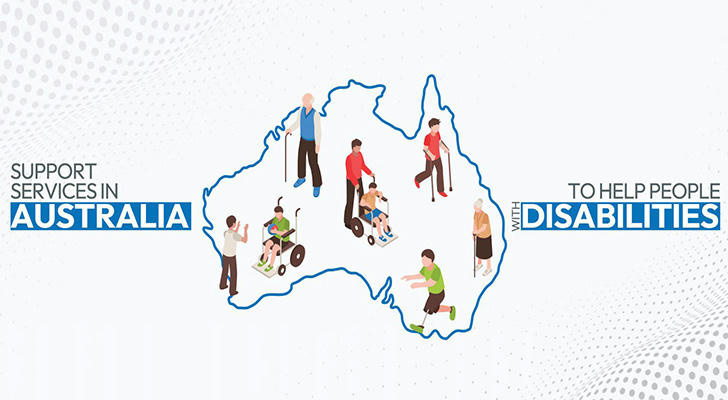A complete guide to Australian Disability Support Worker courses, stable employment
In Australia, the demand for disability support workers is on the rise as more individuals with disabilities require specialized care. To meet this growing demand, various organizations—including the government, TAFE, and private training providers—offer training programs designed to equip aspiring disability support workers with the necessary skills and nationally recognized qualifications.
These programs not only provide essential training but also open doors to a rewarding career with numerous job opportunities.

Career Opportunities in the Disability Sector
Disability support workers can pursue careers in a wide range of settings, such as aged care homes, disability agencies, or private residences. Common roles in the disability sector include Care Coordinator, Disability Support Worker, Disability Officer, and Community Care Worker. Many positions offer flexibility, including part-time or contract-based work.
With increasing demand across regions like New South Wales (NSW), Victoria, and Queensland, the job outlook is extremely positive. Employment opportunities in the disability sector are projected to grow by 31% by 2026. As the population ages and demand for disability services increases, there are long-term career prospects and room for growth for full-time disability support workers.
How to find a reliable Disability Support Worker course
1.Government-supported Training Programs
The Australian government supports aspiring disability support workers through initiatives like JobTrainer, which offers subsidized training in high-demand sectors, including disability care. These programs aim to address skill shortages and make training more accessible. Eligibility for JobTrainer typically depends on factors like age or employment status. This initiative is an excellent option for those looking to gain necessary qualifications without incurring significant costs.
2.TAFE (Technical and Further Education)
TAFE institutions across Australia offer nationally recognized courses in disability support, such as the CHC33021 Certificate III in Individual Support (Disability). These courses provide comprehensive training on key skills, such as person-centered care, communication, and providing assistance to people with disabilities. Many TAFE courses are supported by the government and offer scholarships, particularly for students from disadvantaged backgrounds or regional areas, meaning you don’t have to worry about tuition fees.
Additionally, some TAFE institutions offer fast-track learning options, allowing you to complete the course in as little as 2 to 4 weeks, depending on the schedule. After finishing the program, you will receive a nationally recognized certificate and have access to job placement assistance. Moreover, some schools even support paid training opportunities, where students can earn while they learn, giving them valuable experience in the workplace while studying.
※ For example-TAFE NSW
TAFE NSW is Australia’s leading vocational education and training provider. No matter if you’re a school leaver, changing careers, or wanting to upskill there are many reasons why you should study with TAFE NSW:
High quality industry-relevant training: TAFE NSW offers over 1,200 courses designed in consultation with employers and industry specialists
Practical learning: TAFE NSW offers the highest level of practical training and learning experiences in real world situations, so you’ll be job ready
Class time: 20 hours per week Flexibility: TAFE NSW study options are designed to fit around work, family and other life commitments
Career opportunities: Gain experience and industry connections through work placement opportunities
Support Services: TAFE NSW offers a range of support services including disability, counselling, multicultural, English language, career development and more
Pathways to Degrees: Many TAFE NSW courses have pathways to higher education, check individual course pathways for more
Affordability: TAFE NSW courses are often more affordable than other RTOs. Use the Fee Calculator on the course page to discover if you’re eligible for a subsidy or scholarship
3.Private Registered Training Organizations (RTOs)
Several private registered training organizations (RTOs) across Australia also offer programs in disability support, such as the Certificate III in Individual Support (Disability). These courses typically blend online learning with practical, hands-on experience, providing students with a well-rounded education. Some RTOs provide cash assistance to eligible students, ensuring that cost is not a barrier to entering or advancing in the disability support sector.
4.Other Community-Based Providers
In addition to government-sponsored programs and TAFE, many community-based organizations offer training for disability support workers. These courses often combine online study with practical experience, preparing students for real-world roles in the field. Some of these providers offer specific programs for people from disadvantaged backgrounds or particular regions, ensuring equal access to education for all.

Suitable Roles and Salaries by Age Group
Disability support work is a flexible and inclusive career path open to people of all ages. Here's a breakdown of suitable roles and salary expectations by age group:
| Age Group | Common Roles | Why It’s Suitable |
|---|---|---|
| 18–25 | - Disability Support Worker (Trainee) - Personal Care Assistant - Community Support Worker | Ideal for newcomers; offers training and entry-level experience |
| 26–40 | - Senior Support Worker - Program Facilitator - Team Leader | Good for those with experience seeking advancement or flexibility |
| 41–55 | - Care Coordinator - Behavioural Support Practitioner - Disability Officer | Leverages leadership skills, empathy, and industry knowledge |
| 55+ | - Companion Carer - Respite Worker - Peer Mentor or Trainer | Offers flexible, less physically demanding roles with focus on mentorship and support |
Eligibility and How to Apply
Eligibility depends on the course provider and whether the program is government-funded. For example, JobTrainer often requires applicants to be under a certain age, unemployed, or looking to upskill.
Application Steps:
1. Check Eligibility Visit the provider’s website to review age, residency, and employment criteria.
2. Select a Course Choose a disability support worker course that suits your needs and location.
3. Prepare Documents Get your ID, proof of residency, and any relevant qualifications ready.
4. Apply Online Fill out the application form on the training provider’s website.
5. Complete Any Extra Requirements Some providers may ask for an interview, basic assessment, or police check.
6. Confirm Enrolment Once accepted, you’ll receive course details and can begin training.
Conclusion
With the growing need for skilled disability support workers, pursuing training in this sector is a great career move. Whether through government initiatives, TAFE, or private training providers, there are numerous opportunities to gain qualifications that are nationally recognized and open doors to various job opportunities. These courses provide essential skills, job placement assistance, and in some cases, paid training, making it easier to step into this rewarding and high-demand field.
"Disability support worker training, "you are welcome to join!
